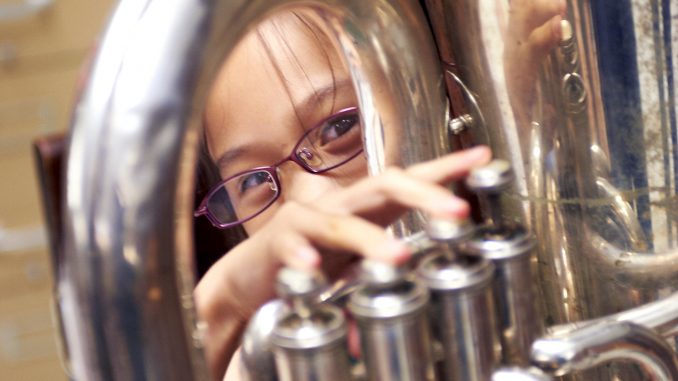

Carrie Lessene, 55, always tells her choir students where she lives.
“They always say to me, ‘Ms. Carrie, you’re gonna leave us next year,’ and I always tell them, ‘I live right near here,’” she said. “‘My church is right around the corner. I’m not gonna leave, don’t y’all know that by now?’”
Lessene, a teaching artist, grew up in Philadelphia, just like the kids that she instructs in her choir and piano classes with Musicopia, a nonprofit music educational organization that provides in-school music residences, workshops, assemblies, music education and instrument donations to schools in the city.
“I bring that urban connection,” Lessene, going on her eighth year with the organization, said. “I grew up here. There’s a lot of things that I’ve done. Sometimes the ones that don’t know me, they ask me where I live like I’m not from here and I’m like, nuh-uh, I live right here. So I say, if I can do that, you can do that. I’m here.”
Patti Stewart, Musicopia program director, said that North Philadelphia schools like George G. Meade Elementary and Tanner G. Duckrey Elementary aren’t getting enough funding from the school district to build an adequate art program and they’re not alone.
As a former administrator at Arise Academy Charter High School, Stewart said that there are problems with the school district and the state that aren’t improving art programs in schools all across the city.
“Philadelphia is in major trouble and people don’t realize it,” Stewart said. “I have had the unfortunate experience of working in the schools. I have the experience of knowing what difference Musicopia made inside, rather than outside.”
Stewart said that during her time at Arise Academy, the first charter school in the country for foster children, sometimes the only qualified teachers coming in to the school were Musicopia teachers.
“Not only did I get to experience how bad these kids plight was, but I saw what a total wreck the school district was,” Stewart said. “A total wreck.”
Stewart said that the situation in the schools has only gotten worse since 2005, but with Musicopia’s 40th anniversary coming up this year, the long-term benefits of the non-profit continue to have an impact on the schools and neighborhoods. Lessene, having grown up in the North Philly neighborhoods, knows just how impactful the arts can be for these kids.
“Because of the Philadelphia school system, I learned a lot of music,” Lessene said. “I had excellent teachers, but that was back when music mattered in the school system. For them to now take out music I don’t think they realize it’s not just learning a C from a D it touches so many other avenues of a child. Because of the music I learned as a child, I was able to travel, to experience things. And they’re taking it away from the kids.”
Roger Lee, another Musicopia teaching artist who recently completed his first 10-week residency inside Meade, Duckrey and Kensington High School for the Creative and Performing Arts, brought hip-hop dance into the organization’s repertoire.
“I thought it would resonate with this community, especially in North Philly,” Lee said. “I saw it as a really educational program for the kids.”
With 15 years of teaching experience, Lee said that the “transformations make it all worthwhile” because he is not only teaching dance routines, he is striving to teach the kids life skills.
“You could be at an F and go to a D-, and that’s great for me,” he said. “It doesn’t have to be an A with me. I just want to see some growth.”
Meredith Haines, Musicopia program manager and 2012 Temple graduate in dance and sociology, said her experience living in North Philadelphia was a “wake up call.”
“It made me more aware of the populations in Philadelphia that weren’t being reached,” Haines said.
Stewart said the question is not whether Musicopia programs are impacting lives in schools – it’s whether or not they graduate eighth grade and never have the same opportunities to stay connected to the arts.
“Education has become a business, as it must,” Stewart said. “And that’s fine, but you’re not turning out a tire, a wing nut or a pencil and the stakes are much, much higher. In terms of the arts, they are the only thing in the world that makes a difference.”
Lee agreed, saying that programs like Musicopia in these schools are critical because sometimes they are some of the only ways for kids to develop skills outside of the classroom like respect, leadership, confidence and manners.
It’s just as necessary as hospitals and other things that we give money to,” Lee said. “It’s not curing cancer, but it’s curing other things that we don’t talk about, that you don’t see on a regular basis.”
Lee had an experience with a young girl with body image issues during his residency this past spring. He said at the beginning of the 10 weeks she couldn’t walk down the hallway with her head held high, let alone put on a costume and dance on stage. However, by the end of the residency, her growth was palatable.
“People who were creating the budget got to see that girl who had no self-confidence, who was finally OK with her body by the end of the residency,” Lee said. “That makes a difference. They saw how kids are building confidence and leadership skills here. This program makes it possible. Without us and other programs like us, there would be no arts.”
Emily Rolen can be reached at emily.rolen@temple.edu and on twitter @Emily_Rolen


Be the first to comment